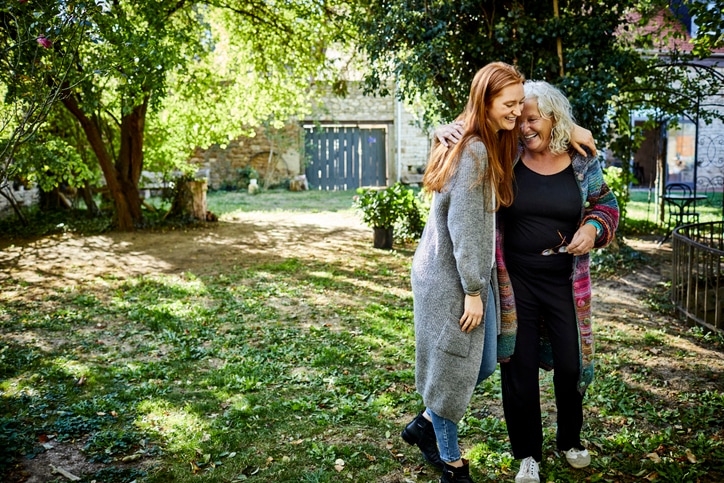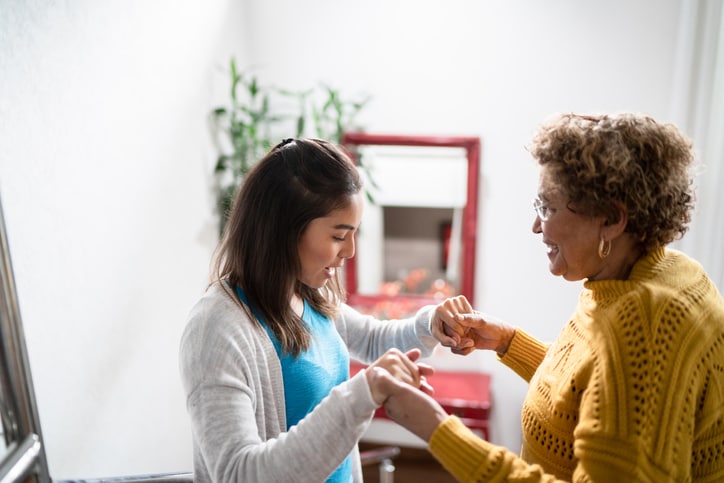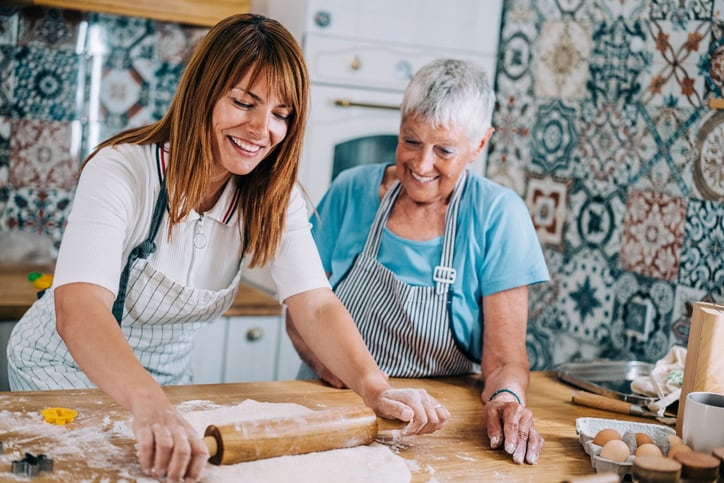If you’re compassionate, patient and have a knack for connecting with others, in-home senior caregiving could be an ideal job for you. But without any prior experience, figuring out how to become a caregiver can feel like a massive undertaking.
“Breaking into the caregiving industry without experience is possible with the right approach and mindset,” says Nicole Brackett, director of quality and care delivery at Homewatch CareGivers, who adds that folks who are “reliable and capable of building strong relationships with clients and their families typically are a good fit.”
From the traits that will come in handy to required trainings, here’s a step-by-step guide for becoming an in-home senior caregiver.
How to become an in-home senior caregiver
Here’s what Brackett and other experts recommend for people hoping to break into the senior caregiving industry.
1. Assess your compatibility
First things first — decide if your personality and demeanor would mesh well with in-home senior caregiving. This type of work requires “empathy, patience, compassion, reliability and adaptability,” notes Brackett.
“Those who excel in this type of work often have a genuine passion for helping others and find fulfillment in making a positive impact on people’s lives,” she continues. “Additionally, you need a willingness to accommodate the evolving needs of clients. Whether providing companionship, assistance with daily activities or specialized care, you need to be attentive to individual preferences and be able to tailor your approach accordingly.
And from a familiarity standpoint, “having personal experience caring for an older family member is a great plus,” according to Irving Seldin, owner and CEO of the home health agency Visiting Angels in Palm Beach Gardens, Florida.
2. Get clear on the type of caregiving
If you deem yourself a good match for caregiving, next it’s time to get clear on the type of position you want to pursue, as there are a number of in-home senior caregiving options, each with varying duties and roles.
“A certified home health aide (HHA) typically has the ability to administer a client’s medications,” explains Asha Tarry, a psychotherapist and certified life and wellness coach who specializes in caregiving for people with dementia. “But they also provide companionship and direction for activities of daily living, such as prompts to eat, escorting clients to their appointments and overseeing a client’s safety in the home.”
“Also, if a client has limited mobility, they may do more intensive care such as bathing, grooming and maintaining a client’s hygiene,” Tarry continues.
In addition to home health aides, other in-home senior caregiver jobs are:
Common in-home caregiver duties
Depending on which path you pursue, in-home senior caregiver duties may involve all or some of the following, per Seldin:
- Medication reminders.
- Meal preparation.
- Help with grooming and personal care.
- Physical transfers.
- Light housekeeping.
- Errands.
- Visits to doctors and activities.
Also important, Tarry notes, is that senior caregivers can effectively communicate in the client’s primary language, as they’re reliant on the caregiver’s ability to prompt for daily activities and convey care goals.
3. Consider caregiver trainings and certifications
The caregiver trainings and certifications you may need depend on the job you’re taking on, as well as your state. For instance, in order to become a home health aide, you need certification through a training program. You can get certified by the National Association of Home Care and Hospice (NAHC), but many community colleges have their own programs.
Certified nursing assistants require formal training, as well, which also varies by state. CNAs typically undergo more training than HHAs.
While companion caregivers require less training than HHAs and CNAs, some certifications are helpful (and may, in fact, be required in some positions).
“Certifications such as CPR and first aid are often required or strongly recommended to handle emergency situations effectively,” Brackett says. “Additionally, completing training programs in topics such as dementia care, Alzheimer’s support or safe use of specialized assistive devices can enhance a caregiver’s skills and knowledge, enabling them to provide more comprehensive care to clients with specific needs.”
Brackett also explains that “continuous education and professional development are encouraged to stay updated on best practices and maintain competency in the ever-evolving healthcare landscape.” This could mean, Tarry notes, “ongoing training on mental health, medication administration and safety protocols such as what to do in case a client falls.”
4. Get caregiving experience
Everyone has to start somewhere. If you have no experience as a senior caregiver, one of the best ways to get in the industry, Seldin notes, is to “enroll in a CNA or HHA program approved by the state.”
Here are other ways to break in, per Brackett:
Research the industry and potential roles. Whether you’re looking to be a CNA or companion caregiver, it’s important to do some role research. Learn about the responsibilities involved and the skills required,” Brackett says. “Understanding the demands of the job will help set realistic expectations.”
Complete relevant training. Completing training programs or courses in caregiving — especially if you don’t have prior experience — can make you a more attractive candidate. Consider getting certified in first aid, CPR or specialized areas such as dementia care.
Volunteer or gain relevant experience. If you’re completely new to the field, consider volunteering at nursing homes, senior centers or hospitals to gain practical experience and exposure to working with seniors, Brackett notes, adding: “This can provide valuable insights and help you build relevant skills.”
Network. Connect with local caregiving agencies, senior care facilities or community organizations that offer caregiving services. This, she says, “can help you learn about job openings and connect with professionals in the field who may offer guidance or opportunities.”
Highlight transferable skills. Even if you don’t have direct caregiving experience, it doesn’t mean you don’t have skills that will come in handy. “Emphasize transferable skills, such as empathy, communication, reliability and a strong work ethic on your resume and during interviews,” Brackett says. “These qualities are highly valued in the caregiving industry.”
Demonstrate commitment and passion. Employers want to work with people who are genuinely passionate about caregiving and committed to making a difference in the lives of seniors. “Express your enthusiasm for the work and your willingness to learn and grow in the role.”
5. Consider the legal and ethical aspects
Before working with older adults, you’ll be required to pass a state-approved criminal background check and DMV check, Seldin notes, adding that drug testing may be a requirement, as well.
It’s also important to keep in mind that senior caregivers are, legally, required to protect the privacy and confidentiality of their clients and comply with Federal HIPAA regulations. Seldin also adds that there are state requirements for reporting suspected abuse.
The bottom line
Getting started as an in-home senior caregiver may take some work, but it’s completely doable. Do your research, undergo any trainings you may need and keep in mind the overall goal, Seldin notes. “In-home senior caregivers can provide a variety of supportive services,” he says, “but ultimately, they’re working to make sure the senior can remain safely and comfortably in their own home.”



